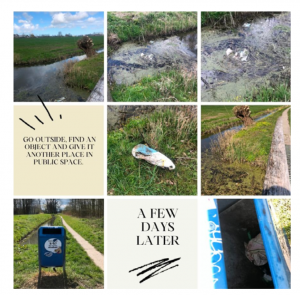Concepts
Proposition
Helene Illeris
In PIMDI we have experimented with the term ‘proposition’ as a possible alternative to, for example, an ‘assignment’ or an ‘exercise’. Inspired by the use of the term by the American philosopher Alfred North Whitehead (1978), a proposition is a situated event, an opening that makes human and nonhuman experiences with and of the world take new directions, or as formulated by the Canadian scholars Erin Manning and Brian Massumi (2020, p. 8):
The proposition is so much more than a statement. It is nothing less than a worlding. It is a serial iteration of the world’s complexing, and re-complexing, of its own relational potential. The proposition is the force of thought gone worlding.
In arts education a proposition is a simple proposal, grounded in experimental experiences and aimed at offering open-ended, exploratory practices to others. In a simplified manner, propositions can be described in the following way (Illeris, 2022):
- A proposition is as an open invitation that someone/something offers to you.
- It is not an assignment but an occasion to open your worldviews and let them develop in new and unexpected directions.
- Instead of explaining and simplifying, a proposition maintains and explores complexity.
- A proposition works from a premise of equality instead of hierarchy.
- A proposition is an occasion to experience sensuous knowledge in the making.
- A proposition is a practice, meaning that you can only create propositions by practicing them yourself before you offer them to others.
Example
During the first PIMDI intensive week that took place online in the spring of 2021, the participating students worked in groups, creating propositions and offering them to one of the other groups. The point of departure was that each student brought an object from their physical surroundings and presented it to the group online along with a short story on the life of the object. Through the objects and stories, a “collective space” was created and from this the groups created propositions for themselves that they tried out in practice before offering them to one of the other groups.
Below you can see an example of one of the propositions that was created:
“Go outside. Find an object and give it another place in public space”.
In order to carry out the proposition a Dutch student, Willette Boersma, found a plastic bag in a ditch and with some difficulty she managed to tear it out of the ditch and to place it on the grass. A few days later the plastic bag had disappeared but after some searching the student found it the in a nearby dust bin.
Carrying out the proposition, each in their own way, made the students materially experience the relationship between objects, surroundings, and human actions, and how these relationships connect to other times and what happened in these places before they got there. In this way they made connections across physical spaces even if they were apart.
Relevance for the pedagogy of imaginative dialogue
Propositions as a pedagogical approach can be an interesting way to facilitate imaginative dialogues in small groups. Because propositions are very open and can be interpreted freely from the idea of opening worldviews, they give participants the possibility to create arts-based narratives that might function as beginnings for prolonged dialogues in/with/through the arts.

Digital collage by Willette Boersma created during the group work with propositions during the online PIMDI intensive week, April, 2021.
References:
Illeris, H. (2022). Lying on the ground. Aesthetic learning processes in the Anthropocene. In: M. Paulsen, j. jagodzinski, S. M. Hawke (Eds.). Pedagogy for the Anthropocene. Re-wilding education for a new earth. (pp. 175-193). Palgrave studies in educational futures. DOI: 10.1007/978-3-030-90980-2_9
Manning, E. & Massumi, B. (2020). For a Whiteheadian Laboratory. How do you make yourself a proposition? In R. Faber, M. Halewood & A. M. Davies (Eds.) Propositions in the Making: Experiments in a Whiteheadian Laboratory. Lexington Books.
Whitehead, A. N. (1978). Process and reality (corrected edition). The Free Press. (Originally published 1929)
